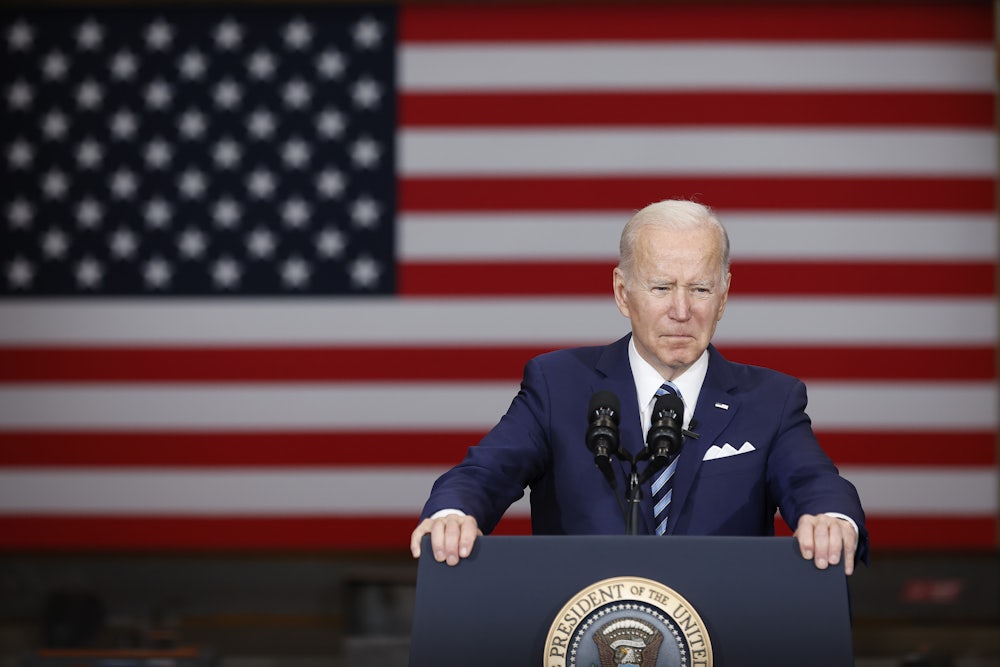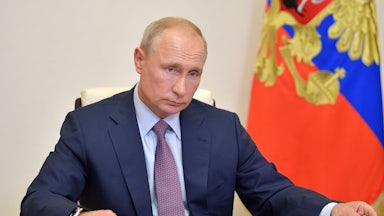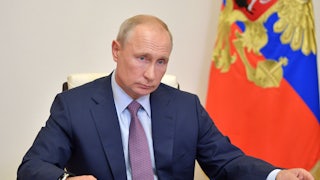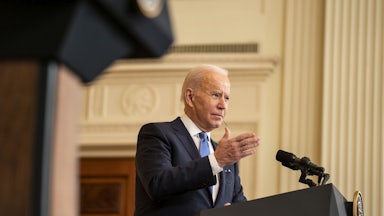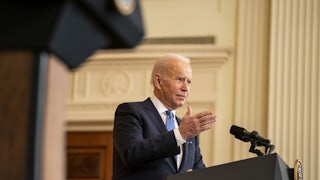Is Vladimir Putin backing down? Tuesday morning’s headlines from The New York Times to The Washington Post to the Financial Times blare that Russia is pulling back some units from the Ukrainian border, even while some other military exercises continue. Putin is meeting with German Chancellor Olaf Scholz today. Ukrainian President Volodymyr Zelenskiy’s seemingly alarming claim that the invasion would take place Wednesday turned out to be a wry remark that got lost in translation as it moved through the media transom. Nevertheless, the United States is temporarily moving its Embassy out of Kyiv, west to Lviv, where it’s safer.
So while there’s a lot we don’t yet know, a clear bottom line for the Biden administration has been etched: Don’t go to war. Period.
If today’s news turns out to be a temporary respite—or a trick—and Russia does invade, cable news will be a nonstop source of images of the invasion for a few days at least. Russian atrocities and deaths of Ukrainian civilians will be emphasized. American neocons and certain Senate front men thereof, notably Democrat Robert Menendez and Republican Marco Rubio—who’s pushing aggression when he’s not apologizing for Donald Trump’s crimes—will get a lot of air time. This last point, incidentally, is one of the key ways in which the mainstream media are failing democracy: If a person can give good blather on foreign policy, TV will anoint that person as an expert, even if he’s gotten everything wrong for a decade or two.
The drums will start beating, the garments rending. Look at this! It’s Stalin all over again! It’s the death of democracy. And look at Biden, doing nothing! First Afghanistan, now Ukraine. And imagine what China thinks as it watches this unfold.
But Biden has to stand firm against all the hype. The administration has been admirably clear so far—no U.S. troops on the ground in Ukraine under any circumstances. It’s a good start. But the administration will have to hold fast, should Putin pull the trigger.
I don’t think the administration’s position will change. But I’m a little more nervous about this than I’d prefer to be. As a senator, Biden used to support bringing Ukraine into NATO, which always horrified me. I could see the case for the Baltic states, I suppose, although even there I wondered: What percentage of the American public will willingly support the loss of American lives to defend a town in Estonia (Narva) they’ve never heard of? Which is not to say that public opinion should drive foreign policy. Most Americans opposed fighting Germany in World War II, at least until Hitler declared war on us. But democratically elected leaders have to explain to the American people why a situation demands American intervention. And that’s a stretch, in the case of Ukraine.
Yes, the neocons are out there. They don’t own the airwaves today, thankfully, in the way they did in 2002–03 in the Iraq run-up. Last December, Frederick Kagan wrote in The Hill that the United States needed to gin up the war machine. He was smart enough not to use the word “war,” but these sentences conveyed the point:
The real trouble is that the West has no stomach for this fight, which would be quite difficult.
Air power alone would not likely be enough to stop that offensive…
[Team Biden] must dispel any uncertainty about defending Ukraine if [Putin] attacks it.
These people never learn anything. Or more likely, they learn what their worldview tells them to learn: that with a little more resolve and firepower and a little less interference from the appeasement caucus, the military intervention du jour would have been a smashing success.
But history records no smashing successes that I can remember. There were, instead, the disastrous quagmires in Vietnam and Iraq. And even most of the interventions that were “successes” from a military or intelligence point of view turned out to be disastrous in a broader sense. We engineered a quick coup in Iran in 1954; what happened next? We installed a ruthless pro-American regime that the people finally expelled in 1979, which was replaced in turn with a ruthless anti-American regime that neocon belligerence has helped to transform into a regional, if not global, power—perhaps soon with nuclear weapons capability. (Let’s recall that Iran only started pursuing its nuclear ambitions in earnest after George W. Bush branded it part of the “axis of evil.”)
I once wanted to believe that the U.S. could pull off such a thing as a “humanitarian intervention,” to use the au courant phrase of the time. This centered mostly around Bosnia in the 1990s, when people like Susan Sontag and Christopher Hitchens were making a morally compelling case that the West had to support a fledgling multiethnic democracy against a blood-and-soil tyrant. I remember being appalled when then–Secretary of States James Baker said to Congress that “we don’t have a dog in this fight.”
Bosnia was a case where some kind of military intervention was justified. That happened; it involved mostly NATO air strikes, and eventually it did lead to peace accords. But a decade later, I remember well when some people tried to argue for invading Iraq on grounds that it would be a humanitarian intervention like Bosnia. What? How was invading a country and remaking it top to bottom the same thing as stopping a mass murderer running a genocide operation in a different nation?
Well, it wasn’t. And the compulsion to draw similar comparisons to the situation in Ukraine should be avoided. Lesson: Always, always be leery of easy historical parallels. Getting militarily involved in Ukraine means getting into a war with Russia, crossing the uncrossable Cold War lines that threatened nuclear annihilation. Maybe Putin will back down. But even if he doesn’t, the fight here is solely economic. If Biden once aspired to bring Ukraine into NATO, he gets the situation now. If Putin does go in, and the war caucus starts trying to whip the country into a frenzy, he’d better stick to his nonguns.
